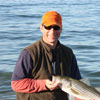5 Boater Safety Courses That Prevent Common Accidents
By Tom Keer
Oct 28, 2015
A boater safety course might not remind you to put the plug in your boat to keep her from filling up with water.
A boater safety course might not remind you to put the plug in your boat to keep her from filling up with water. But one might help you in other ways. Here are five reasons to take one, even if you're an Old Salt.
-
All About Marine Radio. Most of the time we use a radio to chat up other anglers, but unless we're in the United States Navy or Coast Guard we do not use our radios in emergency situations. Learning how to best use a radio sets up boaters for success by bailing 'em out of a jam.
-
Flares and Distress Signals. Ok, so you're in trouble and you are waiting for a rescue ship. What is the best way to signal for help from your location? If you're over the horizon line where the earth's slope keeps flares out of sight, what do you do? (the answer is to shoot a parachute flare). There are lots of options for pyrotechnic distress signals, and this course helps you be prepared.
-
Navigational Rules. Red Right Return, we know that's how you enter a harbor, but what about crossing vessels (boats from the right have right of way), aids to navigation (like nuns and cans), and other rules of the water?
-
Hurricane Prep. Sure there is a hurricane season, and some areas are heavily and routinely hit. Those boaters are well equipped to respond to that situation, but what if you're in a neighboring region that isn't frequently hit?
-
Crew Overboard. Watching a member of your crew fall overboard is pretty scary, particularly because it's caused during stormy weather conditions. While the simple answer is to get 'em back in the boat, there are a lot of different ways to go about it, especially when the water isn't making for an easy rescue.
We're all quick to say we can figure out what to do in an emergency, but having a boat safety checklist helps us take the sting out of a mishap.









